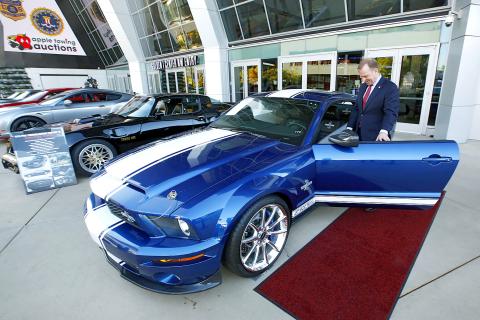An American couple pleaded guilty to running a US$1 billion solar investment scam that they used to finance a luxury lifestyle, including buying Burt Reynolds’ sports car, US authorities announced on Friday.
The California husband-and-wife team was taking money from investors for nonexistent mobile solar generators, which they used to buy a 1978 Firebird that once belonged to the late Hollywood star, luxury homes in the Caribbean and Mexico, jewelry and a baseball team, according to a statement.
They were charged in a wide-ranging case involving the FBI, Internal Revenue Service, Securities and Exchange Commission and other agencies.

Photo: AP
‘PONZI SCHEME’
“By all outer appearances this was a legitimate and successful company,” said Kareem Carter, special agent in charge at IRS Criminal Investigation.
“But in reality it was all just smoke and mirrors — a Ponzi scheme touting tax benefits to the tune of over US$900 million,” Carter said.
According to court documents, between 2011 and 2018, their company, DC Solar, manufactured mobile solar generator units (MSG), that were mounted on trailers and used to provide emergency power to cellphone towers and lighting at sporting events.
Investors were lured in by the promise of generous federal tax credits for solar power and earnings from leases on the units.
NOT REALLY THERE
However, authorities said at least half of the approximately 17,000 solar generators they claimed the company manufactured did not exist.
The conspirators created false financial statements and obtained false lease contracts, among other efforts to conceal the fraud.
Jeff Carpoff, 49, of Martinez, pleaded guilty to conspiracy to commit wire fraud and money laundering and faces up to 30 years in prison, according to the statement.
His wife, Paulette Carpoff, 46, pleaded guilty to conspiracy to commit an offense against the US and money laundering.
A federal judge is due to decide their sentence on May 19.
US Attorney McGregor Scott said the couple forfeited US$120 million in assets, including 148 luxury and collector cars, which recovered over US$8 million that will be returned to victims.
Authorities have returned US$500 million to the US Treasury to date, he said.
Four associates of the couple previously pleaded guilty to federal criminal charges related to the fraud scheme since October.

BYPASSING CHINA TARIFFS: In the first five months of this year, Foxconn sent US$4.4bn of iPhones to the US from India, compared with US$3.7bn in the whole of last year Nearly all the iPhones exported by Foxconn Technology Group (富士康科技集團) from India went to the US between March and last month, customs data showed, far above last year’s average of 50 percent and a clear sign of Apple Inc’s efforts to bypass high US tariffs imposed on China. The numbers, being reported by Reuters for the first time, show that Apple has realigned its India exports to almost exclusively serve the US market, when previously the devices were more widely distributed to nations including the Netherlands and the Czech Republic. During March to last month, Foxconn, known as Hon Hai Precision Industry

Taiwan Semiconductor Manufacturing Co (TSMC, 台積電) and the University of Tokyo (UTokyo) yesterday announced the launch of the TSMC-UTokyo Lab to promote advanced semiconductor research, education and talent development. The lab is TSMC’s first laboratory collaboration with a university outside Taiwan, the company said in a statement. The lab would leverage “the extensive knowledge, experience, and creativity” of both institutions, the company said. It is located in the Asano Section of UTokyo’s Hongo, Tokyo, campus and would be managed by UTokyo faculty, guided by directors from UTokyo and TSMC, the company said. TSMC began working with UTokyo in 2019, resulting in 21 research projects,

Ashton Hall’s morning routine involves dunking his head in iced Saratoga Spring Water. For the company that sells the bottled water — Hall’s brand of choice for drinking, brushing his teeth and submerging himself — that is fantastic news. “We’re so thankful to this incredible fitness influencer called Ashton Hall,” Saratoga owner Primo Brands Corp’s CEO Robbert Rietbroek said on an earnings call after Hall’s morning routine video went viral. “He really helped put our brand on the map.” Primo Brands, which was not affiliated with Hall when he made his video, is among the increasing number of companies benefiting from influencer

Quanta Computer Inc (廣達) chairman Barry Lam (林百里) yesterday expressed a downbeat view about the prospects of humanoid robots, given high manufacturing costs and a lack of target customers. Despite rising demand and high expectations for humanoid robots, high research-and-development costs and uncertain profitability remain major concerns, Lam told reporters following the company’s annual shareholders’ meeting in Taoyuan. “Since it seems a bit unworthy to use such high-cost robots to do household chores, I believe robots designed for specific purposes would be more valuable and present a better business opportunity,” Lam said Instead of investing in humanoid robots, Quanta has opted to invest